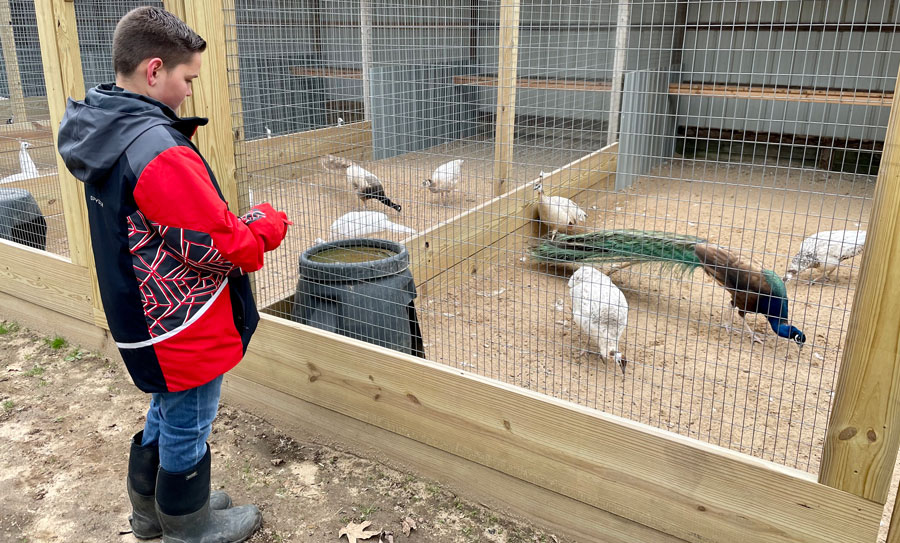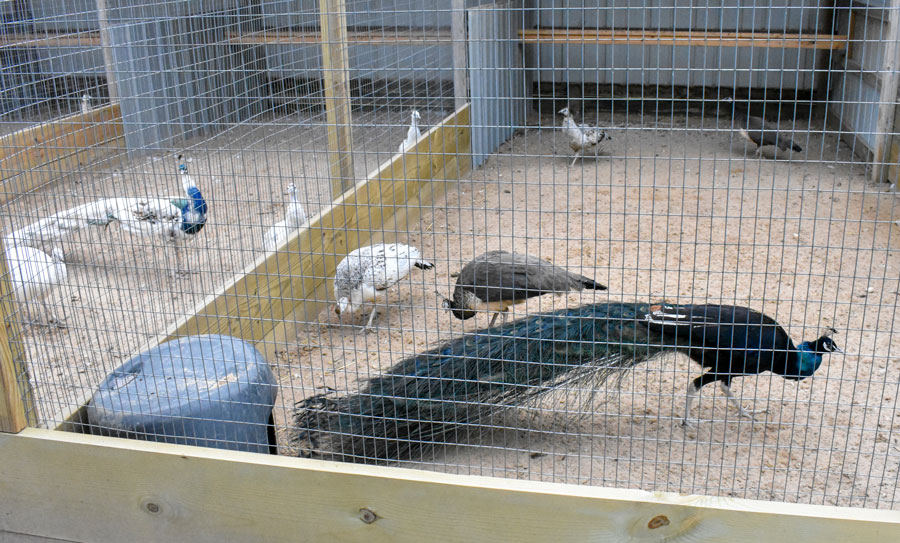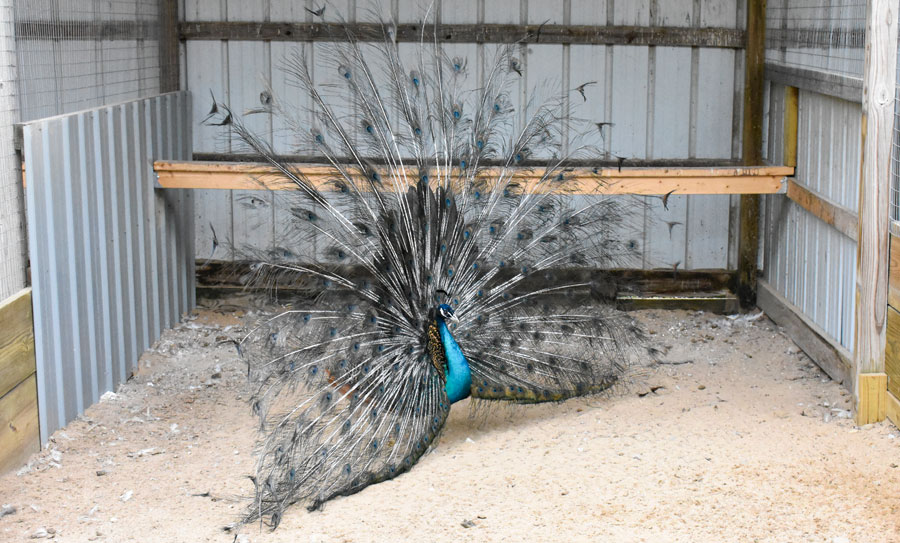Name: Cole Spicer
School: Cedar View Elementary
Jam: Peacock, pheasant, chicken and goat farming
Cedar Springs — The view from Cole Spicer’s bedroom includes row upon row of peacock pens, full of birds the color of the rainbow.
He’s a pro at animal auctions, recently scoring a screaming deal on three Black Orpington chickens.
He can explain the anatomy of pregnant spotted boer goats.
He’s been interviewed by a National Geographic TV crew and once met Kid Rock’s bodyguard (who was in town to purchase a peacock from his farm, naturally).
Not many fifth-graders can say that they live on an exotic peafowl and pheasant farm. But to Cole, life on the farm is hard to describe because it’s just… life.
“To be honest, you just gotta see it for yourself,” he said. “I can’t really explain a good way to talk about it because I’ve been raised with all these animals and it’s kind of normal for me. I feel like I’m just living a normal, ordinary life.”
Cole is the right-hand man for parents Randy and Lianna Spicer, owners of the Spicer Ornamental Bird Farm in Cedar Springs. The farm raises peafowl, pheasants, chickens and goats for breeding and selling, and is also the peacock supplier for National Geographic’s reality TV show “The Incredible Dr. Pol.”
How old were you when you began working on the farm, and what are your responsibilities?
“I was probably about 3 when I started doing some chores, and when I was 5 it got more in depth,” said Cole, whose parents started their hobby farm before he was born.
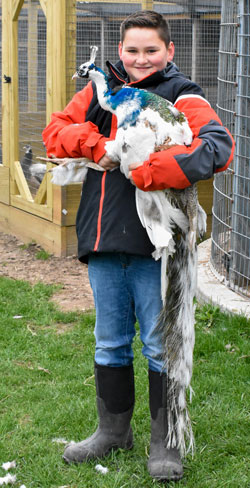
Every day after school and on weekends, he’s in charge of watering and sometimes feeding all the birds on the farm. (In one year, the farm will raise more than 250 peacocks alone.) He gathers all the eggs that have been laid that day — dozens and dozens of them — and marks the breed on any eggs they plan to hatch. He’s also responsible for the care and feeding of the farm’s four cats, plus his one indoor pet, a guinea pig.
“Life on a farm is ongoing; you’re doing it every day, no matter what. All of it probably takes at least a half an hour, but sometimes it depends on how motivated I am. If I’m dragging one day, it might take me an hour.”
He also accompanies his parents on some of their many trips to animal sales and auctions. In addition to feeding and watering the birds while on the road, he does everything from helping to build the travel cages to selling peacock feathers to earn some extra cash.
Cole doesn’t do as much day-to-day work with the farm’s collection of spotted boer goats, but his help can be invaluable when a doe is giving birth, father Randy said: “Since Cole has smaller arms right now, he can get in there to make sure that all the babies are clear. So he’s been ‘this deep’ in a goat, pulling kids out.”
Said Cole of the experience: “I wasn’t nervous. Maybe a little.”
Cole also started showing a goat with 4H last year and had fun at the fair. This year he’s working with a young goat named Tesla, teaching the kid to be led on a halter and present well to the judges at the Kent County Youth Fair.
What are some accomplishments or things you’re proud of?
“I’m proud of the hard work I do, because it pays off. Like my work with the eggs — I just the other day collected and cleaned 19 dozen eggs and took them to the mill. I save up my money and that’s how I had enough money to pay for my chickens.
“I’ve also learned that you really have to socialize with your animals, and if you work with them enough it really shows and you can do fun things with them. I like how social the peacocks and chickens are with me — they come over when I’m around and I think they just like me.”
Cole noted that this work paid off with his goat last year, the first time he participated in 4H. His goat was so well trained and friendly that plenty of other people at the fair took notice.
“I’ll be completely honest, at first your goat may not seem like they will be socializable,” he cautioned. “But you can change that by working with them, being by their side and helping them get used to more people. Of course, my mom and dad helped me get a head start with that last year.”
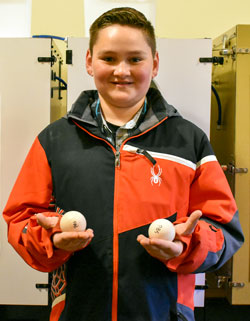
What is the most important thing you’ve learned about working on a farm?
“Don’t give up. If an animal is sick or having trouble, I feel like whatever you have to do, do it, either by yourself or find someone to help you.”
And Cole doesn’t just say this; he lives it. A few years ago, Daisy the goat gave birth to twins, a boy and a girl. For some reason, however, she rejected the baby girl and was giving the boy all of her milk. That’s when Cole stepped in.
“Every morning, before school, I’d get out of bed a little earlier and I’d go out to the barn. I would hold Daisy against the wall and make sure both babies got all the milk they wanted. And when I came home from school I’d go out there again, and at night I’d do it again, too. I’d repeat that over and over again for about a month, to make sure that Roxy (the baby girl) could get fed.”
What adults have made an impact in your life?
“My mom and dad. They’ve taught me how to tell if peacocks are a boy or girl, what to do with eggs, how to lead my goat and just a lot of random stuff throughout the years.”
What other interests or hobbies do you have?
Cole enjoys dirtbiking — “I’m not too good at the shifting part yet, but I’m working on it” — and is an avid sketcher, with a sketchbook full of drawings of characters from Marvel and The Mandalorian. He also has big dreams for his Lego collection (keep reading).
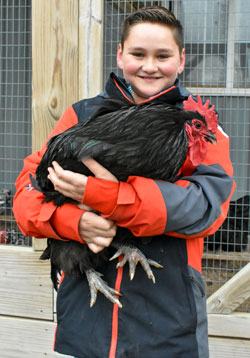
Do you want to work with animals for a living?
“This might sound a little crazy since I have this big farm and everything, but I would love to be a Lego YouTuber. Once I saw Legos at a friend’s house and thought it was really neat, and ever since I’ve been collecting them and really love them.”
Cole said he doesn’t picture himself ever owning a farm quite as big as the one he lives on now, but definitely wants animals to be a part of his life when he grows up.
“I would like to have a couple chickens, and I want to have a dog and definitely some cats. And a guinea pig. I think I’d like to stick to the small animals because I feel like they’re easier to take care of and I don’t have to worry about the responsibility of having, like, 100 peacocks all on my own. I don’t worry about that on our farm, because we work hard and I have my mom and dad. But by myself I feel like I should stick with the small animals. I really like them, and caring for the chickens really doesn’t feel like a chore.”



